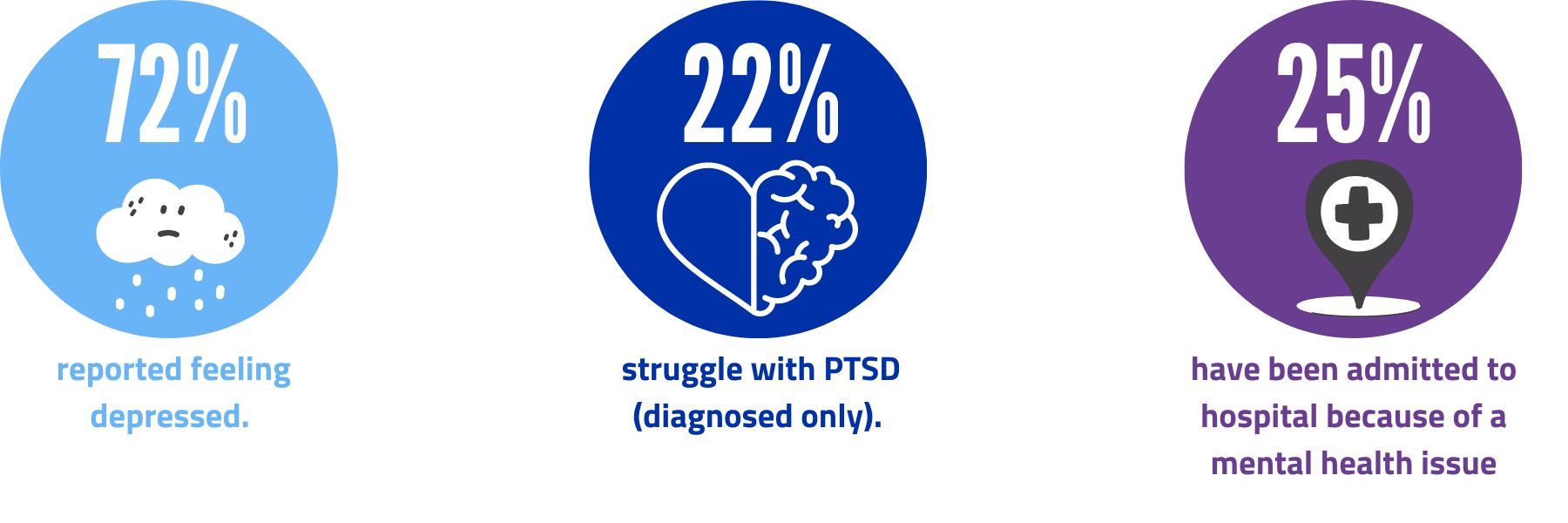
This Mental Health Awareness Week, we stand with the 48% of people sleeping rough in Westminster who have been diagnosed with a mental health condition.
In addition to these numbers it is likely that the amount of people who are undiagnosed and struggling with their mental health is high. When we looked at records from our own day centre, over 90% of the people we support struggle with their mental health.
This shows us the significance of Mental Health Awareness Week for a homeless charity like The Connection at St. Martin’s. Unfortunately, homelessness and poor mental health often go hand in hand. While each person’s story is different, this is often caused by a cycle of traumas from before, during and after a person’s time on the streets.

These experiences can be tough to recover from when living on the streets and, as little support is accessible to many, people sleeping rough often see their mental health decline. This can have life-changing negative consequences such as developing unhealthy coping mechanisms.
This year’s theme for Mental Health Awareness Week is ‘anxiety’, something many of us can relate to. It’s common to worry about making your rent but for some, this becomes unmanageable. Fears about rent can quickly shift to anxiety over when you’ll be able to sleep tonight, what your family will think and how you’ll keep your job.
Clearly, mental health is something we need to address openly and honestly within homelessness charities.
Homelessness and mental health: the facts
Nariman came to the UK to escape a traumatic life in Iran where the government enforced violent laws.
“They [the authorities] saw a tattoo and one of them said that tattoos are against the law. They arrested me and said they had to remove it for me. So, they brought some battery acid and they put it on my arm. I had to leave.”
Once Nariman got to the UK, things started to look up. However, during his time here the law changed meaning he could no longer work because he was an asylum seeker. Nariman began to really struggle and was soon left homeless.
“All of my savings had run out, because I spent my money on a solicitor three times. And when my final appeal was rejected, I thought this is the last one, there’s no hope for me. All the hope finished…”
Nariman’s experiences, like many others, show us the traumatising impact homelessness can have. These experiences can be isolating and feel unescapable without the right support.
Discover Nariman’s full story here.
People experiencing homelessness have greater levels of poor mental health than the general public. The below statistics highlight the extent of the issue and how many different challenges people sleeping rough can face.

The issues facing people sleeping rough are deeply worrying and while we can’t ‘fix’ someone’s mental health overnight, there are steps we can all take to help be there for people when they are struggling.
How do we support people?
Relationship Building
Every step a person takes with us is guided by our relationship-first approach. This can be a slow process but we understand some people have had traumatic relationships and/or support experiences so we take this into account when working with people and put their comfort first, always.
This can help people feel safe in our centre and make working with us a calming experience rather than one that might add to a person’s anxieties over homelessness.
Psychologically-Informed Environment (PIE)
We also take great care to include mental health considerations into every part of our centre. As part of this, we’ve developed a ‘psychologically-informed environment’, or PIE, with South London and Maudsley NHS Foundation Trust (SLaM). This means all our services are designed to help people to overcome mental health barriers to accessing support to get the help they need. This can be as simple as painting the walls more soothing colours, or more complex, such as tailoring our support to take every person’s trauma into account.
Mental Health Support
When working with us, people can meet with our in-house psychologist to discuss the issues they are facing and the help they can receive. We appreciate this can be too formal and overwhelming for some so people are welcome to start chatting with their key worker about this first, or have them in the room when they begin therapy.
We are also able to refer people to support for problems they face as a result of their mental health concerns, like drug addiction.
However people find us, we will always work with them to understand their mental health concerns in a way that suits them. This can often be a big first step in recovering from life on the streets.
How to support us this Mental Health Awareness Week and beyond
We see people who need support with their mental health all year round. If you would like to help us be there, find out how to get involved here.
